A tasteful scarf covering her short, dark hair instead of the typical director's hat; T-shirt and jeans replacing her favoured Fab India kurta pyjama, Nandita Das is, for a change, behind the camera.
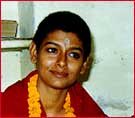
In the four years during which fame happened to her through Fire, Water and, most recently, Bavandar (or Sandstorm), she had wanted to make a film.
"Acting is only a small part," she feels. "More important is direction. A film is, ultimately, the director's vision."
This, what she surveys now, is her Vision. In front is her cameraman, her sets, her characters. Clay in her hands, to shape the way she wants.
Nandita Das has turned director.
Right?
WRONG.
I can sense Das' disapproval long-distance. This is our second interview. The first was nearly four years ago, before Fire was released in India.
Das was still the girl-next-door then. And I had almost managed to get thrown out on my ear for suggesting that being famed painter Jatin Das' daughter helped her land the role.
Today, I rub her the wrong way when I ask, "Could you tell me about the film you are directing?"
"You've got it wrong," she says, on her mobile phone. "I am not directing a film!"
I swear I haven't misread the fine print: That news was all over film publications. Das had "announced" her new calling -- and here is the lady herself saying, Nope, Nothing Of That Sort.
 Maybe she hasn't contradicted that nugget hard enough, or maybe newsmen, having got what they wanted, hadn't bothered to listen. Anyway, this is not the time to get into the what and why -- especially when she isn't all that pleased to hear my voice.
Maybe she hasn't contradicted that nugget hard enough, or maybe newsmen, having got what they wanted, hadn't bothered to listen. Anyway, this is not the time to get into the what and why -- especially when she isn't all that pleased to hear my voice.
Which is how we meet in Delhi days later.
Face to face is how Das likes her interviews. Goes to show that controversy and fame -- or infamy, as her critics would have it -- haven't succeeded in setting their dreadful trappings on her. She isn't too busy for a sit-down and, thank goodness, doesn't own an all-powerful press agent yet.
But being an actress, being public property, has wreaked some havoc on her. For one, she seems to have lost weight.
"No," she counters. "I have lost my hair."
That too, courtesy the stalled Water, for which she had to crop her hair.
Also, Das has learnt to be pragmatic about media doings. Being misquoted isn't all that tragic anymore. Look at this drama over her "turning director".
What had transpired, she tells me, is that she was asked in Bangalore whether she would like to direct a film. Of course!
As to when, well, "it could be a year, two years, five years, 10 years... maybe never."
"I used to get very agitated when journalists misquoted me or put things out of context," she says. "Now I just say, 'Okay, this is part of the whole deal'. There's no escape!
"Like you know, journalists have decided that I look down on commercial cinema. They find it more sensational to say, 'Oh, when everybody else is going that way, she isn't'.
"But it is not like I am judging anything. This is the way I want to live; this is the kind of cinema I can relate to.
"Also, I keep saying that pretentious, boring art cinema is as much a no-no as, say, meaningless or hyper commercial films. (Anyway) there is nothing commercial in art anymore -- it is (either) a good film or a bad film. I keep reiterating that.
"Still, there was a heading: 'I do not like the shallowness of Hindi films'. I have never used words like that!"
We are interrupted by the telephone. While the lady of the house attends to it, let's check out her careergraph.
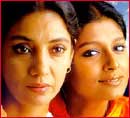 Controversial isn't the word for Das. She isn't. Not as a person.
Controversial isn't the word for Das. She isn't. Not as a person.
Whatever controversy has attached itself to her has done so because of her films, the characters she portrayed therein -- Sita in Fire, Shanta in 1947 -- Earth, Janaki in Water...
Neither is Das really famous. Not in the strict sense. She is still an actress, not a star, right?
But look at it this way: Who else has been so selective, acted in about 12 films -- spread over several regional languages -- and still managed to be so known?
Along the way came changes, too. She shifted her residence to a more spacious location in South Delhi, acquired an additional landline and a mobile phone to handle the increased traffic of calls, travelled widely...
And found her personal space shrinking alarmingly.
Das came into the profession by accident. Being an actress had never figured in her career plans. A post-graduate in social work, she was, before she touched Fire, working amongst children. She still does, when time permits.
"Initially," she says, "I thought acting was like any other profession. You work; you come home. But then, I realised that my life was expanding much more.
"My infrastructure is still the same. Like I still answer my own calls; I still buy my own vegetables. But suddenly you feel everything is being judged.
"If I drive a Fiat now, people say, 'You are an actress, it doesn't look nice'.
"When I am buying vegetables, I often hear, 'That's Nandita Das' and, 'No, it can't be, she wouldn't buy her own vegetables'.
"Then you get so many calls... Earlier, to have someone to pick up your calls seemed a luxury. I used to think, 'Oh, my god, how pompous!' Now I realise it is a real need.
"So you change certain ideas as your life expands. But at the same time, I am conscious that I don't want it to expand beyond a certain point. You don't want to lose your personal space."
That, unfortunately, is something that Das hasn't been able to prevent.
"I just feel there is a lot of insensitiveness on the part of people. People don't respect each other's space. And the whole thing sort of gets to me at times. That's my reason for staying in Delhi."
That decision is constantly criticised. Well-wishers keep telling her, 'Your time is running out. As it is, you came into this field very late. You have to be seen in this profession'.
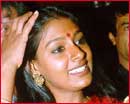 That's where Das draws her line. Not relocating to Bombay, she says, is how she has managed to preserve "the little personal space" she has now.
That's where Das draws her line. Not relocating to Bombay, she says, is how she has managed to preserve "the little personal space" she has now.
One sacrifice that Das had to make for her career is her social work. The many workshops she used to conduct for underprivileged children before have now shrunk to a few.
"I would love to do more workshops. But with children, you need a lot of energy, a lot of focus. You can't think about 50 other things at the same time. They are very perceptive, they will know immediately," she says.
Now that she is a public figure, how do children react to her? Well, Das tries not to reveal her celluloid status. Some do recognise her, but she makes it a point to see that doesn't overwhelm them in any way.
Das is back. As she re-pins the microphone to her collar, she says, casually: "Oh, I am sorry, but we may be disturbed again. You see, today is my birthday."
I groan inwardly. Just like the insensitive people she has been telling me about, I barged in that very day, without -- forget the flowers -- even a mumbled greeting.
"Oh, I am not celebrating it really. No special plans," she tells me, I suspect, more in consolation. You know, her equivalent of, 'Hey, it's okay, buddy. I haven't noticed your faux pas'.
"Now where were we?" she asks, "Ah, I was telling you about -- "
That's one thing about Das. She's probably the coolest person around to interview. I mean, where your average subject has to be pushed, prodded, cajoled and guided, Das will tell you everything on her own.
Confident, opinionated, she knows how to speak her mind clearly, to the last 'T'. Nudge an occasional nudge, and be sure that at the end of the session, you can walk away with a rich recording.
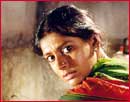 "The most important thing is the script and the director," Das is telling me how she picks her films. "Then it is the role. It is the third thing because no role can be seen in isolation.
"The most important thing is the script and the director," Das is telling me how she picks her films. "Then it is the role. It is the third thing because no role can be seen in isolation.
"And finally, it is your instinct. I have got the best of roles from 'known' directors, but something has not happened. I have felt like, I don't want to work with him! That kind of honesty and sincerity has to come through from the director.
"If the person is sincere, you will know that at least you will enjoy the process and the film will be honest."
'Honest'. That's the criterion? The kind of film that Das would like to direct eventually?
"It would be a film that touches the emotion and the intellect," she clarifies. "I want my film to make you laugh, cry, think, entertain -- good cinema.
"Technically, it should be good, but not to the extent that it overpowers you. It has to have a lot of things. It is almost like an ideal man -- it should be something that is, in every way, a complete experience."
Ideal man? Das laughs. She knows what's coming. No, she hasn't found The One (or if she has, isn't telling).
But marriage is a definite Yes.
"Well, I love children. So I think I will get married because I want to have children," she laughs. "I know, in my case, it seems to be going backward!"
"I realise that there is no ideal man," she continues. "I am not the ideal woman. So why should one look for an ideal man? But, somebody whom you can share your feelings with, who is sensitive, has a sense of humour, doesn't judge you too much. Let's see!"
I nudge her towards Water. It is still in a flux, she says. But she is hopeful that it will work out by January.
"For Water to happen is very important. More because of what it represents now -- there should be freedom of expression," she says. "Let it come out, let people decide for themselves whether there is anything derogatory or scandalous in it."
Das tells me about Bavandar, her latest ripple in the film world. Inspired by the story of a woman who was gangraped seven years ago, it is about her struggle for justice -- or, as Das puts it, "her journey of strength."
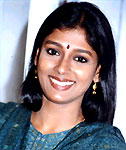 "She is still struggling for justice. Hopefully, the film will give strength to other women like her," she says. "In our society, the victim is made to feel humiliated and guilty for somebody else's crime."
"She is still struggling for justice. Hopefully, the film will give strength to other women like her," she says. "In our society, the victim is made to feel humiliated and guilty for somebody else's crime."
Her projects in hand include a Gujarati film with Paresh Naik, the title role in Rituparno Ghosh's Binodini and Rakesh Mehra's Aks, the Amitabh Bachchan-starrer. Das plays his wife in it.
"He's an icon. So there was a certain amount of excitement while shooting," she says. "But I also feel that it is a collective effort and you have to do your own thing. Because I have not grown up seeing so many commercial films, I wasn't really overawed with him. He is very professional, very punctual. Really good to work with."
As we conclude, I ask, "Any other projects?"
Oh, offers are many. "But nothing really exciting."
The last I hear is, "I am sorry for the interruptions. I hope the interview went well."
It did, lady. Thank you very much.